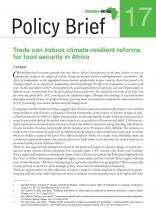Policy brief 17: Trade can induce climate-resilient reforms for food security in Africa

Commodity-based economic growth that has driven Africa’s development in the past decades is now in jeopardy owing to the impact of climate change on natural resources and agricultural commodities. The effects of temperature on the aggregated macroeconomic productivity in poor countries have been found to be linearly related1 to an increase in temperature, primarily through the effects of temperature on workers and crops. Lobell and others (2011)2 demonstrated the nonlinearity between warming and yield relationships in African maize, in particular how the final yield of maize under rain-fed conditions was reduced by 1 per cent for every day spent above 30oC, even by just one additional degree. Through those findings, it was underscored that approximately 65 per cent of Africa’s maize-growing areas will experience temperature-induced yield losses at 1oC of warming, even under optimal rain-fed management.
Emerging scientific evidence further suggests that climate-response measures will require crop varieties better suited to new climatic conditions, following the severity of the impact of climate change on agricultural production in Africa. Higher temperatures are shortening the length of the growing period of crops, in particular during the period when there is an accumulation of biomass and yield.3 Unfortunately, the rapid rise in temperature in the tropics limits the ability to intervene using breeding and adoption of new varieties of maize, for example, which requires up to 30 years to fully develop. The situation is made worse by recurrent drought that is redefining the production areas of key base crops, such as maize, which is widely consumed by some 300 million people in Africa as a staple food. Similarly, there are correlations reported between the spatial patterns of yield losses in maize with the spatial patterns in increased aridity in sub-Saharan Africa.